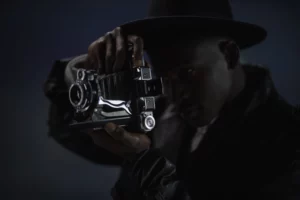Imagine this: you’ve had a string of suspicious activity around your home recently. Valuables have gone missing, and you’ve spotted strange individuals lurking nearby. You’re worried and anxious, unsure of what to do next. You need answers, you need evidence, and you need someone who can discreetly help you uncover the truth. In comes the role of a domestic private investigator.
Private investigations in a domestic setting can range from tracking a possibly unfaithful partner to checking on a nanny’s behavior with your child. Whether you’re trying to safeguard your family, property, or personal reputation, these investigations are a powerful tool to give you peace of mind and clarity.

However, this world can seem overwhelming and fraught with complexities, especially for a newcomer. This guide is designed to demystify the process, define what a domestic private investigator does, and provide actionable insights on how you can use their services effectively. The goal here is to arm you with all the necessary information so you feel confident and prepared when you make the decision to hire a private investigator.
What is a domestic private investigation?
A home is supposed to be a place of safety and comfort, a sanctuary where one can escape the stresses of the world. However, when things go awry, you might need to take extra measures to ensure that your home remains that sanctuary. This is where domestic private investigations come in.
But what exactly do we mean when we say “domestic private investigation”?
In its simplest form, it refers to a thorough inquiry or examination of issues occurring within personal relationships or within the home. It’s a branch of detective work that focuses on situations tied to household or familial circumstances.
Now, you might be wondering, “What kind of situations warrant an investigation?” The scope can be quite broad, but here are a few common scenarios:
Marital Infidelity: If you suspect your spouse is being unfaithful, a private investigator can help confirm or dispel your suspicions. They can provide concrete evidence such as photos, videos, or witness testimonies that can be helpful, especially if you’re considering a divorce.
Child Custody Cases: In custody battles, the safety and welfare of the child are paramount. Private investigators can help gather evidence that attests to a parent’s ability or inability to provide a safe and nurturing environment.
Background Checks: Before hiring someone to work in your home, such as a nanny, a housekeeper, or even a tenant, you might want to ensure they have a clean record. A private investigator can carry out background checks to uncover any criminal records, verification of identity, and even past employment history.
Missing Persons: If a loved one or a family member goes missing, a private investigator can work in parallel with law enforcement to find them. They have resources and methods that can expedite the process.
Stalking or harassment: If you feel that you’re being stalked or harassed, a private investigator can help identify the culprit and gather the necessary evidence for a restraining order or court case.
Elder Abuse: Unfortunately, elderly family members can sometimes be victims of abuse, often financial. Private investigators can help confirm these suspicions and gather the necessary evidence.
Remember, the goal here is not to encourage mistrust or paranoia. Instead, it’s about ensuring the safety and wellbeing of you and your loved ones by providing clarity and truth in complex, emotionally charged situations.
The investigators role

Now that we’ve peeled back the layers of what a domestic private investigation entails, let’s turn our attention to the professionals at the heart of these operations: the domestic private investigators. Who are they, what do they do, and what skills do they need to carry out their work effectively?
What Does a Domestic Private Investigator Do?
In a nutshell, a domestic private investigator’s job is to find facts and analyze information about personal, financial, and legal matters. They offer many services, including verifying individuals’ backgrounds, tracing missing persons, and investigating computer crimes. More specifically, in a domestic setting, they are the eyes and ears that help you uncover the truth about the situations we discussed earlier.
Here are some specific roles a domestic private investigator might play:
Conducting surveillance: They might stake out a location to observe a person’s activities and interactions. This could involve taking photographs or video recordings.
Collecting Evidence: For cases related to infidelity, child custody, or elder abuse, they would collect evidence that could be used in court proceedings. This could include photographs, video recordings, and written reports.
Performing background checks: They could verify an individual’s employment status, income, and criminal history.
Interviewing People: They might interview friends, family members, or colleagues to gather more information about a person or situation.
Searching Public and Private Records: They often look for clues in a variety of records, ranging from court filings to internet databases, to piece together a case.
What skills do they need?
So, what does it take to be an effective domestic private investigator? Here are a few key skills:
Discretion: This might seem obvious, but it’s worth emphasizing. A good private investigator is discreet, respecting your privacy, and maintaining the confidentiality of the investigation at all times.
Critical Thinking: They need to think logically and analytically to gather information, make connections, and solve cases.
Communication Skills: They should be able to effectively communicate with clients, witnesses, and law enforcement officials. This includes both listening and conveying information clearly.
Patience: Investigations can be time-consuming and may not always yield immediate results. Patience is essential for sifting through information and waiting for the right opportunity to gather evidence.
Tenacity: Sometimes, the key to cracking a case is sheer persistence. A good private investigator won’t give up easily.
Understanding of Laws and Ethics: They need to be well-versed in local laws and understand the ethical implications of their work. This is crucial to ensuring that the evidence they collect is legally admissible in court.
Technological savvy: In the digital age, many investigations involve online searches and digital forensics. A good private investigator will be comfortable using a variety of technologies and platforms.
The Process

While every investigation is unique, depending on the specifics of the case, the general process typically involves the following steps:
Initial Consultation
The process starts when you, the client, reach out to a private investigator. This can be in response to a suspicion, a gut feeling, or a known issue that needs to be addressed. The first meeting with the investigator (either in person, via phone, or online) is typically a free consultation. Here, you explain your concerns, and the investigator assesses whether they can help. It’s also an opportunity for you to gauge if the investigator is a good fit for you professionally and personally.
Development of an Investigation Plan
After the initial consultation, the investigator will devise a plan of action. This could involve surveillance, background checks, interviews, or a combination of these. The plan should be customized to meet your specific needs and goals. At this stage, the investigator will provide an estimate of the costs involved. Transparency about fees and expenses is crucial to avoiding any surprises down the line.
Execution of the Investigation
Once the plan is agreed upon, the investigator commences with the inquiry. This could involve watching a person, conducting interviews, performing database searches, or gathering information through other means. This stage can take anywhere from a few days to several weeks, depending on the complexity of the case.
Reporting
During and after the investigation, the private investigator will provide you with updates and reports on their findings. This can include video or photographic evidence, documents, and a written report detailing their observations and conclusions. They should also be available to discuss their findings, answer your questions, and clarify any uncertainties you may have.
Post-Investigation Follow-Up
The investigator’s role doesn’t necessarily end when the investigation concludes. Depending on the case, they may be called to testify in court, particularly if the evidence they collected is pivotal to the legal proceedings.
Bear in mind that while this process typically flows in this sequence, it can be adjusted or rerouted based on evolving circumstances and new discoveries. A good investigator remains flexible and ready to revise their strategy as necessary.
Selecting an Investigator

Selecting a private investigator is a crucial step, as the right match can significantly impact the outcomes of your investigation.
Essential Credentials to Look For
Licenses and Certifications: Most states require private investigators to be licensed. Inquire about their license number and verify it independently. They may also hold professional certifications, which further endorse their skills and expertise.
Professional Experience and Specialization: Consider their experience and field of specialization. If your case involves child custody, for instance, an investigator with a strong background in family law would be ideal.
Insurance: Ensure that the investigator has liability insurance. This protects you and them should anything go wrong during the investigation.
Affiliations: Membership in professional organizations, such as the Association of Certified Fraud Examiners (ACFE) or the National Association of Legal Investigators (NALI), can be a positive sign of their commitment to the field.
Red Flags to Avoid
While the above points can help you find a suitable investigator, there are also some red flags you should be aware of:
Lack of Transparent Communication: If they seem reluctant to share details about how they’ll handle your case or are vague about their fees and terms, take this as a warning sign.
Unverifiable Credentials: If you can’t independently verify their licensing or professional certifications, this is a major red flag.
Guarantees on Results: Be wary of investigators who promise specific results upfront. Investigations are uncertain by nature, and no ethical investigator would guarantee outcomes before the work begins.
Inappropriate Methods: If an investigator suggests using illegal or unethical methods (such as hacking into personal accounts or trespassing on private property), steer clear. Not only is it against the law, but any evidence obtained this way cannot be used in court.
Real-life Cases and Outcomes

Now that we’ve explored the what, who, and how of domestic private investigations, let’s bring it all to life with some real-world examples. While names and identifying details have been changed to protect confidentiality, these cases provide a genuine insight into the workings and outcomes of domestic private investigations.
Case 1: The Disappearing Spouse
John, a successful businessman, hired a private investigator when his wife, Laura, disappeared without a trace. The police had reached a dead end in their investigations, and John was desperate to find his wife.
The private investigator started by conducting an in-depth background check on Laura and interviewing her friends, co-workers, and family members. Through this, they discovered that Laura had been visiting a small town frequently over the past few months. With this lead, the investigator went to the town and, through surveillance and local inquiries, found Laura living under a different identity.
Turned out, Laura had voluntarily disappeared due to personal reasons. While the discovery was difficult for John, the investigator’s work brought much-needed closure to an uncertain situation.
Case 2: The Custody Battle
Sarah was embroiled in a fierce custody battle with her ex-husband, David. She had suspicions that David was neglecting their children during his custodial time, but she needed proof to present in court.
She hired a private investigator to conduct surveillance during David’s visitation periods. The investigator documented several instances of neglect and even mild endangerment, such as David leaving the young children unattended at a public park while he was at a nearby bar.
With this evidence, Sarah was able to secure full custody of her children, ensuring their safety and well-being.
Final Thoughts
We’ve journeyed together through the world of domestic private investigations, peering into its various aspects, understanding the roles and responsibilities of a domestic private investigator, and learning the steps you can take to select the right professional for your case.
You’ve also gained insights into the general process, from the initial consultation to the final report and potential court testimony.
Choosing to engage a domestic private investigator is a significant decision that can greatly impact your life and the lives of those around you. It’s crucial to ensure that you make this choice with a clear understanding of what’s involved and realistic expectations of what can be achieved.
- Communication is crucial: Be sure that you and your investigator can communicate openly and transparently.
- Credentials matter: Check their licenses, insurance, professional affiliations, and experience.
- Watch out for red flags: If something seems too good to be true, it probably is.
- Ethics and legality are non-negotiable: Any investigation must respect the law and ethical standards.
Your journey might start with a question, a suspicion, or a need for concrete evidence. Regardless of where it begins, it’s a journey towards clarity, understanding, and ultimately resolution. Trust the process, know your rights, and ensure that you’re working with an experienced, reputable professional.

